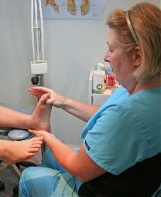Diabetes
Having Diabetes puts a person at risk of developing many complications which include foot problems. This is due to an increased risk of diseased blood vessels, particularly the smallest ones in the kidneys, at the back of the eyes and the extremities, i.e. the feet. In addition the nerves supplied by those small vessels can become damaged. Diabetic neuropathy is a term used to describe nerve damage, which most commonly affects the leg and foot. It is also thought to be linked with blood sugar levels that are too high and causes messages from the leg or foot to the brain to become distorted. Effects of diabetic neuropathy include:
- Lack of Sensation
- Lack of awareness of pain
- Lack of awareness of hot and cold
- Pins and Needles
- Burning Feelings
- Shooting pains
- Numbness
Lack of sensation can be dangerous, as cuts and minor injuries can be overlooked because ‘they don’t hurt’. However, because it is not painful does not mean that the problem is not serious. By following some simple steps, you can help prevent diabetic foot problems:
Good control of your blood sugar level is essential to prevent nerve damage – always try to follow your doctor’s guidelines. For further information check out the relevant pages on the Diabetes UK website; www.diabetes.org.uk
- Examine your feet daily for cuts, bruises, chaffed skin, or any other problems.
- Wash and thoroughly dry your feet daily.
- Wash your feet in tepid water (not hot), and always check the temperature of the water with your hand or elbow before bathing.
- Avoid direct heat to your feet (for instance, from hot water bottles or electric blankets).
- Never sit too close to electric, gas, coal or other types of fire.
- Never walk barefoot.
- Never cut corns or hard skin yourself.
- Never use ‘corn cures’.
- Have your feet measured prior to buying new shoes to ensure that they are a good fit.
- Avoid shoes which have seams or rough edges on the inside (check with your hand).
- Look and feel with your hand for any foreign objects, such as stones, before putting on your shoes each day.
- Get shoes with thick soles so that there is plenty of cushioning under your feet.
- Your shoes should also have straps, laces or Velcro to hold them snugly on at the back, but make sure that there is plenty of room for your toes at the front of the shoe. A deep square shaped toe-box is advisable.
- Cut your nails straight across or, if advised by your doctor, have them cut professionally. Don’t ‘poke’ down the sides of your nails.
- Do not smoke.
- Avoid excessive alcohol intake.
- When in the sun, always use high factor sunscreen on your feet and always wear suitable footwear to protect them. Never walk barefoot on hot sand or pebble stones.


